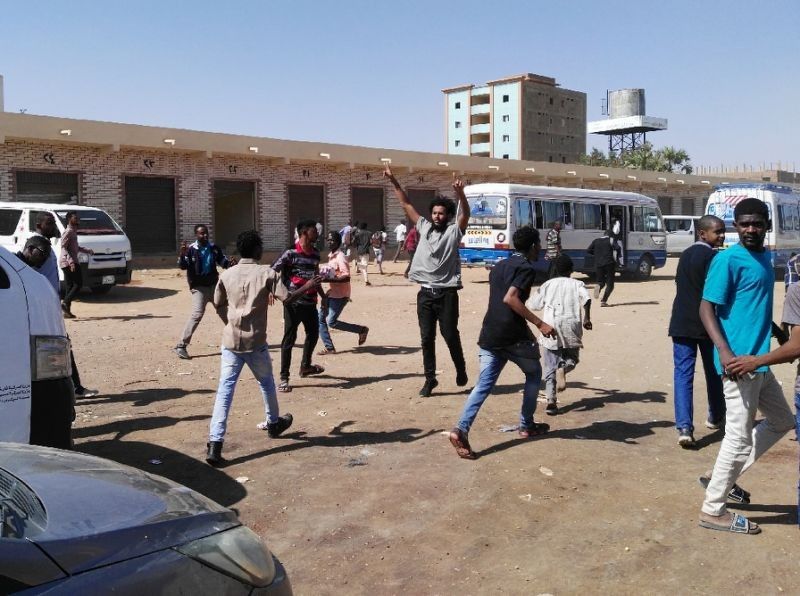Sudan police fire tear gas as protesters press on with demos

Khartoum - Sudanese police fired tear gas yesterday at crowds of anti-government protesters in Khartoum and war-torn Darfur as organisers called for more nationwide rallies against President Omar al-Bashir this week.
The demonstrations in Darfur were the first of their kind since unrest erupted on December 19 over a government decision to triple the price of bread.
The protests have since swiftly escalated into nationwide rallies widely seen as the biggest threat to Bashir's rule in his three decades in power.
Protesters who took to the streets in the capital's Bahari district chanting "peace, peace" and "revolution is the people's choice" were quickly confronted by riot police, witnesses told AFP.
Authorities say the protests have left 24 people dead so far, while Human Rights Watch has put the death toll at 40, including children and medical staff.
The European Union said on Friday that security forces have used "live ammunition" against protesters causing casualties, although Sudanese officials including Bashir have blamed the violence on "thugs" and "conspirators".
Protest organisers have called for near daily demonstrations across the country against Bashir this week, calling it a "Week of Uprising".
In Khartoum on yesterday protesters were seen carrying the Sudanese flag as others held banners bearing the words "peace, justice, freedom", which has become a key slogan in the rallies.
Witnesses told AFP that police were pursuing protesters down Bahari's streets and alleys.
"It's like a cat and mouse game," a witness said.
- Stench of tear gas -
Many of the protesters were women who wore masks to protect themselves from tear gas as they whistled and clapped in the streets of Bahari, the hub of yesterday's demonstration, witnesses said.
Some residents in Bahari took protesters inside their homes and offered them juice as tear gas canisters stuck the facades of their buildings, a witness said.
Video posted on social media showed police arresting several protesters. The footage could not be independently verified.
Police dispersed the rally later on yesterday, but the smell of tear gas lingered across the neighbourhood, witnesses said.
Several streets remained blocked with burnt tyres and rocks thrown by protesters, a witness said, adding that riot police, some in vehicles loaded with machineguns, remained deployed in the area.
Protests broke out in Darfur after calls for rallies there by the Sudanese Professionals' Association, which has spearheaded the demonstrations.
Police fired tear gas at demonstrators who took to the streets of El-Fasher, the capital of North Darfur state and in Niyala, the capital of South Darfur state, witnesses said.
Darfur, a region the size of France, has been torn by violence since 2003 when ethnic minority rebels took up arms against Khartoum, accusing it of economic and political marginalisation.
Bashir, who seized power in an Islamist-backed coup in 1989, has been charged by the Hague-based International Criminal Court (ICC) with genocide and war crimes allegedly committed in Darfur.
- Economic crisis -
Protests were also reported in the central town of Madani and in some villages of the eastern impoverished, agricultural province of Gadaref.
Anti-government demonstrations first erupted last month in towns and villages before later spreading to Khartoum.
Rights groups say more than 1,000 people have been arrested since the protests began, including opposition leaders, activists and journalists as well as demonstrators.
The crackdown has drawn international criticism, with countries like Britain, Norway, Canada and the United States warning Khartoum that its actions could "have an impact" on its relations with their governments.
Although the unrest was triggered by the rise in the price of bread, Sudan has faced a mounting economic crisis over the past year, led by an acute shortage of foreign currency.
Repeated shortages of food and fuel have been reported in several cities, including Khartoum, while the cost of food and medicine has more than doubled.
Bashir and other officials have blamed Washington for Sudan's economic woes.
The US imposed a trade embargo on Khartoum in 1997 that was lifted only in October 2017. It restricted Sudan from conducting international business and financial transactions.
But critics of Bashir say his government's mismanagement of key sectors and its huge spending on fighting ethnic minority rebellions in Darfur and areas near the South Sudan border have been stoking economic trouble for years.
- Latest
- Trending


































